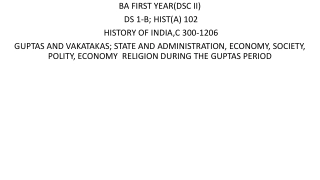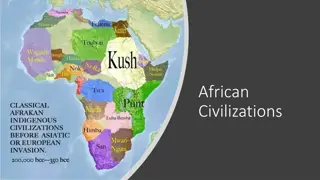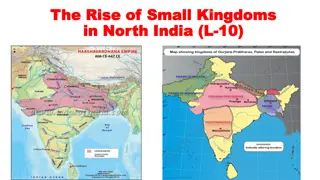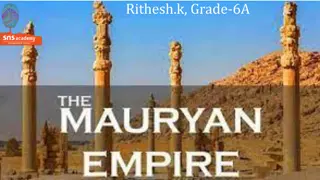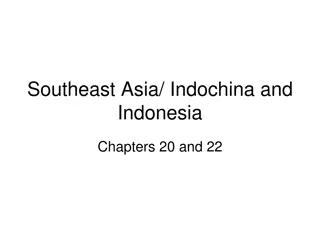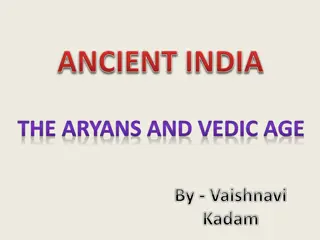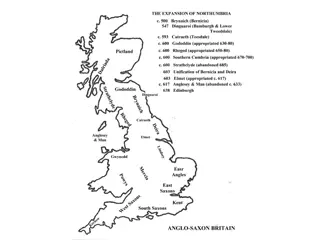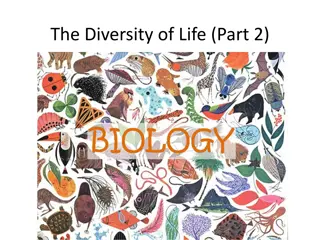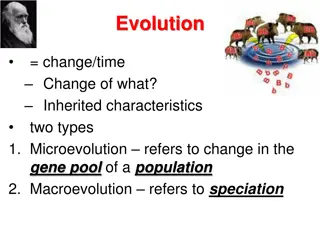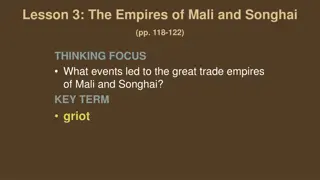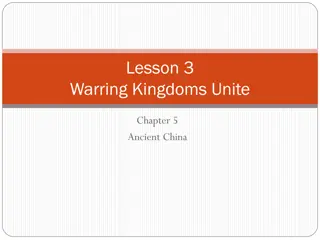Emergence and Expansion of Powers Before the Guptas
Explore the political landscape of ancient India before the rise of the Guptas, including minor powers and rulers like Kushanas, Nagas, Vakatakas, Ikshvakus, and more. Learn about the varied kingdoms and emerging territories shaping the region's history.
6 views • 25 slides
Insights into the Sangam Age and the Three Kingdoms of Tamilakam
Explore the rich historical era of Tamilakam during the Sangam Age, featuring the Cholas, Cheras, and Pandyas dynasties vying for supremacy in South India. Learn about the literary treasures of Sangam literature and the significant contributions of these three kingdoms to the cultural landscape of a
0 views • 15 slides
Ancient African Civilizations and Kingdoms
Explore the rich history of ancient African civilizations and kingdoms, including the Kingdom of Egypt, Kingdom of Kush, and Kingdom of Aksum. Learn about significant leaders like King Menes and Queen Nefertiti, and discover the remarkable achievements and cultural advancements of these societies in
0 views • 14 slides
Regulation of Energy Homeostasis by AMPK System and Its Modulation Factors
The AMPK system plays a crucial role in regulating energy homeostasis by sensing the cellular AMP:ATP ratio and responding to metabolic stresses that affect ATP production or consumption. AMPK is activated by factors such as hypoxia, glucose deprivation, and metabolic inhibitors, as well as by compo
0 views • 27 slides
Sub-Saharan Kingdoms of Ghana and Mali: Rise and Fall
The Sub-Saharan Kingdoms of Ghana and Mali were powerful empires in Western Africa, known for their wealth in gold and salt trade. Ghana emerged in 500 A.D. as the first great traders in West Africa, with strong rulers and a well-trained army. The empire of Ghana controlled all gold trade and had a
2 views • 17 slides
Cultural History of India: Early Vedic Period and Aryans
The period of the Aryans in ancient India marked a transition from the Indus Valley Civilization to the Vedic Civilization. The Aryans, possibly migrants from various regions, integrated with the indigenous Dravidians to form the Vedic society. Their culture, as depicted in the Vedas and epics like
0 views • 10 slides
Exploring the Six Kingdoms of Life
Delve into the fascinating world of the six kingdoms – Archaea, Eubacteria, Protista, Fungi, Plantae, and Animalia. Discover their unique characteristics, reproduction methods, cell types, food sources, and example organisms. From extremophiles in volcanic vents to ancient trees that live for cent
1 views • 9 slides
Contrasting Kingdoms: Archaebacteria vs Eubacteria
Archaebacteria and Eubacteria are two distinct kingdoms of bacteria with unique characteristics. Archaebacteria, originating from Ancient Greek, are ancient organisms thriving in extreme conditions without peptidoglycan in their cell walls, while Eubacteria, the most common bacteria, have peptidogly
0 views • 11 slides
Ancient Kingdoms of Gonds and Ahoms: Legacy and Administration
The Gonds and Ahoms were ancient tribes with rich histories in India. The Gonds, known for their decentralized administrative system led by various clans, had important rulers like Aman Das and Durgawati. Resources like wild elephants brought wealth but fell to the Mughals. The Ahoms, originating fr
0 views • 8 slides
Rajput and Religious Policy of Mughal Emperors: Akbar vs. Aurangzeb
Akbar, the first Mughal emperor, pursued a diplomatic policy towards the Rajputs, aiming to bring them under his suzerainty while maintaining friendly relations. His successor, Aurangzeb, adopted a more aggressive approach, seeking to annex Rajput kingdoms due to religious differences. This shift in
0 views • 6 slides
Emergence of Small Kingdoms in North India During 8th to 10th Century
The rise of small kingdoms in North India between 750 CE to 1000 CE was a result of the disintegration of empires, economic struggles, and weak administration. This period saw the emergence of powerful kingdoms like the Rastrakutas, Palas, and Pratiharas in different regions of India, each contribut
0 views • 28 slides
Rise of Janapadas and Mahajanapadas in Vedic India
The rise of Janapadas and Mahajanapadas marked a significant transition in the political landscape of Vedic India. Janapadas, major kingdoms of that era, evolved into more powerful Mahajanapadas through territorial expansion and urbanization. The shift from tribal polities to territorial states led
0 views • 9 slides
Insights into Daniel's End-Times Prophecy and Visions
Explore the profound insights of the Book of Daniel, unraveling the backbone of end-times prophecy and key events like the Babylonian captivity, Nebuchadnezzar's dream, practical lessons, and visions of the four beasts. Uncover the divine revelations on kingdoms, the ancient of days, son of man, the
0 views • 17 slides
Overview of Mauryan Empire: Chandragupta, Bindusara, and Ashoka
Mauryan Empire, established by the Mauryas, was the first major empire in India, encompassing a vast territory and surpassing previous dynasties in land control. Chandragupta Maurya, Bindusara, and Ashoka were key emperors who shaped the empire's history. Chandragupta, supported by Chanakya, conquer
0 views • 13 slides
Enhancing Social-Emotional Learning Through Engaging Classroom Activities
Explore a variety of creative activities to promote social-emotional learning in the classroom, ranging from managing anger to expressing different emotions. With input from Senior Teacher Irena Mitskovska at Hadzhi Gencho Primary School in Teteven, Bulgaria, discover innovative techniques such as d
0 views • 17 slides
Origins and Development of Oyo and Dahomey Kingdoms
Origins and early development of the Oyo and Dahomey kingdoms located in modern-day Benin and Nigeria. Oyo, a Yoruba kingdom, had roots in Ile-Ife and emerged as a regional power through trade and military prowess. Dahomey, an Aja kingdom, rose in the 18th century with influences from Yoruba traditi
3 views • 11 slides
Precolonial Administration in Nigeria: A Historical Analysis
Nigeria's precolonial administration was characterized by diverse kingdoms and empires with unique social structures and governance systems. The Hausa/Fulani society, for example, had a centralized political system organized around city-states, while other societies operated with decentralized power
0 views • 22 slides
A Gospel-Centered Glance at Daniel: Sovereign Control in Past and Future
Explore the profound themes of God's sovereign control in the book of Daniel, from the preservation of a remnant to visions of future events, such as the seventy weeks prophecy and the succession of kingdoms. Discover the intricate tapestry of prophecy and fulfillment that ultimately points to God's
0 views • 31 slides
Influence of Indian and Islamic Kingdoms in Southeast Asia
Southeast Asia, comprising mainland and archipelago regions, has a rich history of ancient kingdoms influenced by India and China. The Khmer Empire in Cambodia, Srivijaya in Sumatra, and the Sultanate of Malacca in Malaysia are key examples. These kingdoms evolved unique cultures blending Hinduism,
0 views • 28 slides
Analytical Study of Thalangi Ennai: A Pain Relieving Siddha Medicated Oil
Siddha, Ayurveda, and Unani are the major traditional systems of medicine in Sri Lanka, with Siddha focusing on therapeutic practices. Thalangai ennai, a Siddha medicated oil, is clinically proven to provide pain relief properties. This oil is prepared at the Siddha Drug Unit in Jaffna and distribut
0 views • 36 slides
Understanding Competition and Adaptation in Nature
Animals and plants compete for limited resources to survive in their environments. Competition drives adaptation, where the best-adapted organisms emerge as winners, ensuring their survival. Various examples from the animal and plant kingdoms illustrate how organisms compete and adapt to their surro
0 views • 45 slides
Life Classification and Diversity Lesson Plan for 7th Grade Science Class
In this 7th-grade science lesson plan taught by Dr. Murzynowski, students will learn about classifying life based on characteristics, comparing animals to plants, distinguishing between micro and macro organisms, creating a dichotomous key, identifying the 6 kingdoms of life, and understanding commo
0 views • 7 slides
Understanding Taxonomy and Classification in Biology
Scientists use classification to group organisms logically, making it easier to study life's diversity. Taxonomy assigns universally accepted names to organisms using binomial nomenclature. Carolus Linnaeus developed this system, organizing organisms into species, genus, family, order, class, phylum
0 views • 11 slides
Exploring the Fascinating World of Living Beings: Classification, Characteristics, and Beyond
Delve into the intriguing realm of living beings with Assistant Teacher Amina Afroze at Foundation School. Explore the classification of organisms into different superkingdoms, kingdoms, and species. Learn about the diverse characteristics of organisms such as monera, protista, fungi, plantea, and a
0 views • 14 slides
Understanding the Classification of Living Organisms
Living organisms are classified into five kingdoms, each further divided into smaller groups called phyla, classes, orders, and genus. The five kingdoms are Monera, Fungi, Protista, Plantae, and Animalia. Animals are categorized into invertebrates and vertebrates, with significant agricultural impor
0 views • 50 slides
Exploring Kingdoms Protista and Fungi: Characteristics and Structures
Dive into the world of Protista and Fungi through this interactive review. Discover the unique characteristics of protists, identify different types of protists, and learn about essential structures in protists such as contractile vacuoles. Explore the significance of compounds like fucoxanthin in b
0 views • 27 slides
The Relationship of Daniel in History
Exploring the correlation between Daniel 11, 8, and 9 in historical events such as the rise of Persia, Greece, the conquest of the Beautiful Land, and the impact of Pagan Rome. The narrative delves into the reigns of notable figures like Alexander the Great and the division of kingdoms post their ru
0 views • 11 slides
The Aryans and Vedic Age - An Overview of Early and Later Vedic Periods
The Aryans, believed to have originated from Central Asia, played a significant role in shaping the Vedic Age in ancient India. This period saw the emergence of key political, economic, and religious developments, contributing to the foundation of Hinduism. From the Early Vedic Period characterized
0 views • 19 slides
Precolonial Administration in Nigeria: Governance Systems and Structures
Nigeria's precolonial era was characterized by diverse societies with various governance structures such as the centralized Hausa/Fulani system and decentralized systems. Different kingdoms and empires existed, each with its unique social organization, political leadership, and economic activities.
0 views • 22 slides
History of Northumbrian Kings from Ida to Ecgberht I
Founded by Ida, the Bernicia and Deiran royal houses played significant roles in the formation of Northumbrian kingdoms, with leaders such as Edwin, Oswald, and Oswiu shaping the region's history through battles and alliances. The Northumbrian kings faced challenges, including battles against Mercia
0 views • 7 slides
Stories from 1 & 2 Samuel: Kings, Prophets, and Kingdoms
Explore the captivating tales from the books of 1 and 2 Samuel in the Hebrew Bible. Delve into the rejection of King Saul, David's triumph over Goliath, and the intricacies of David's reign, including his encounter with Bathsheba. Witness the rise of the Kingdom of Israel, from the period of judges
0 views • 16 slides
A Glance at the Kings and Prophets of Judah and Israel
Explore the rise, reign, and disobedience of Solomon, the division and demise of the kingdoms, and the prophetic ministry in the Old Testament. Delve into the reigns of the kings of Judah and Israel, emphasizing the importance of trust in God's word and the validation of prophecy.
0 views • 14 slides
Exploring the Diversity of Life: A Journey through Different Domains and Kingdoms
Delve into the fascinating world of biological diversity, from the three domains of Bacteria, Archaea, and Eukaryota to the various kingdoms within Eukaryotas like Protists and Fungi. Discover the unique characteristics and habitats of each type of organism, highlighting the importance of understand
0 views • 11 slides
Understanding Evolution and Species Classification
Explore key concepts such as microevolution, macroevolution, species definition, population genetics, and the development of new species through variation over time. Learn about the importance of isolation in species formation, the hierarchical classification system, and the six kingdoms of life.
0 views • 24 slides
Exploring Daniel's Prophecies and the Kingdom of God
Delve into the prophecies of Daniel, from God's sovereign control in the past to his future plans for the kingdoms of the world. Witness the vision of the Son of Man and the establishment of an everlasting kingdom. Discover the significance of Jesus as the Son of Man who will come to establish his r
0 views • 24 slides
The Empires of Mali and Songhai: Rise of Prosperous Trade and Powerful Kingdoms
Mali and Songhai rose to prominence through events like King Sundiata's defeat of Ghana, leading to prosperous trade in gold and salt, and Mansa Musa's expansion and enrichment of the empire. Griots played a key role in passing down the stories of these empires, showcasing their cultural significanc
0 views • 27 slides
Understanding Biodiversity and Classification of Living Organisms
Explore the world of biodiversity and the classification of living organisms in Grade 7 Natural Sciences - Term 1. Learn about the five main kingdoms, Carl Linnaeus' taxonomy work, and the seven-level classification system he introduced. Discover how organisms are grouped and categorized to better s
0 views • 17 slides
Insights into Ashoka: The Emperor Who Embraced Peace
Explore the legacy of Ashoka, an influential ruler in history known for his transition towards peace, as seen through his inscriptions and the Mauryan Dynasty. Discover the difference between kingdoms and empires, the significance of dynasties, and the administration in Ashoka's vast empire. Learn a
0 views • 10 slides
Ancient China: Rise of the Qin Dynasty under Shi Huangdi's Rule
Explore the history of Ancient China as Shi Huangdi conquers warring kingdoms to unify the land. Discover how he became China's First Emperor, strengthened the empire, organized the government, and built the Great Wall for protection. Learn about the legacy and impact of the Qin Dynasty in shaping C
0 views • 25 slides
Rise and Fall of the Pandya Kingdom in South India
The Pandya Kingdom, along with the Chera and Chola kingdoms, collectively known as the Muvender, ruled different regions in South India. The Pandya Kingdom was located at the southern tip of the Indian peninsula with Madurai as its capital. It prospered through trade with the Roman Empire and left b
0 views • 21 slides
